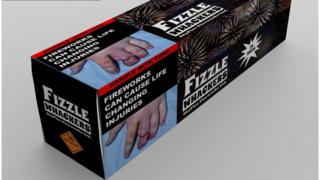
Image copyright
BAPRAS
Plastic surgeons want graphic images like this one of an injured hand on fireworks packets
Senior doctors are calling for graphic images of injuries to be displayed on firework packaging.
Plastic surgeons say the number of life-changing injuries is rising every year despite numerous safety campaigns.
They believe shocking images, like the one they have mocked up using a man’s severely damaged hand, might deter buyers.
Half of those seen in hospital last year were aged 18 or under, and 80% were male.
‘Handling explosives’
The campaign is being led by the British Association of Plastic, Reconstructive and Aesthetic Surgeons (Bapras).
Bapras president David Ward said: “We are extremely concerned about the continued misuse of fireworks, particularly by those under the age of 18 away from organised events.
“Although [fireworks are] packaged in a jovial, toy-like fashion, people forget that when using fireworks, they are handling explosives which can cause extremely serious injuries that may require extensive reconstructive surgery.
“Bapras is calling on the government to make a common-sense change by legislating to ensure all firework packaging in the UK includes mandatory graphic warning notices, similar to those found on cigarette packaging.”
Almost 4,500 people in England attended A&E with injuries from fireworks last year, double the number in 2009-10, according to figures from NHS Digital.
- ‘I lost my eye after firework exploded’
- Hotel ‘saddened’ by fireworks injuries
- Stray fireworks injure 14 at display
Image copyright
BAPRAS
The Bapras campaign: people need to remember that fireworks are explosives
Surgeons say injuries are typically caused by people throwing rockets which either explode early, or hit someone close by.
Image copyright
BAPRAS
Surgeons have had to reconstruct this man’s fingers
‘I can’t feed myself’
The hand used in the campaign belongs to a 25-year-old-man from Wales, who did not wish to be identified.
“My friend threw a firework which landed by my feet. When I picked it up to move it out of the way, it exploded in my hand. I’ve had five operations, with plastic surgeons reconstructing parts of my fingers, and months later I still have three operations to go.
“The incident has had a huge impact on my life. I can’t feed myself or play with my new-born kid.
“A clearer warning label might have made me and my friend think twice about the potential danger,” he said.
Many fireworks are currently packaged in the bold colours of children’s toys, and the warnings are often found in small boxes on the back of the packaging.
Image copyright
Diane Labombarbe
Fireworks are usually packaged in bright toy-like colours
Legally you have to be 18 or over to buy fireworks, yet the hospital statistics show that many injuries requiring surgery are in males under the age of 18.
Jim Fitzpatrick, MP for Poplar and Limehouse, is also supporting the campaign.
“There is an urgent need for government to introduce graphic warnings on firework packaging. The hope is that a graphic image of the potential dangers of misuse may stop someone in their tracks, preventing a possible life-changing injury.”
A YouGov poll of 2,020 adults conducted in October found that 62% supported introducing graphic warnings on fireworks packaging.
The campaign is also being supported by the Royal College of Surgeons and the British Society for Surgery of the Hand.



